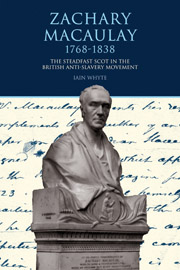Book contents
- Frontmatter
- Contents
- Foreword
- Acknowledgements
- Abbreviations
- List of Illustrations
- Chronology
- Introduction
- 1 From Inverary to the Sierra Leone River
- 2 Slave Traders and French Invaders
- 3 Captive in Love—to Selina Mills
- 4 The Trials of the Governor
- 5 Caught in a Multitude of Tasks
- 6 Clapham, Family and Friends
- 7 Attempting to Win France for Abolition
- 8 ‘Let Us Look it Up in Macaulay’—The Anti-Slavery Arms Manufacturer
- 9 Commerce and Conflict
- 10 Triumph and Tragedy on the Path to Glory
- 11 As Others Saw Him—As We Might Assess Him
- Bibliography
- Index
5 - Caught in a Multitude of Tasks
- Frontmatter
- Contents
- Foreword
- Acknowledgements
- Abbreviations
- List of Illustrations
- Chronology
- Introduction
- 1 From Inverary to the Sierra Leone River
- 2 Slave Traders and French Invaders
- 3 Captive in Love—to Selina Mills
- 4 The Trials of the Governor
- 5 Caught in a Multitude of Tasks
- 6 Clapham, Family and Friends
- 7 Attempting to Win France for Abolition
- 8 ‘Let Us Look it Up in Macaulay’—The Anti-Slavery Arms Manufacturer
- 9 Commerce and Conflict
- 10 Triumph and Tragedy on the Path to Glory
- 11 As Others Saw Him—As We Might Assess Him
- Bibliography
- Index
Summary
The African Children
In April 1798 Thomas Ludham arrived in Sierra Leone to succeed Macaulay as Governor. However Gray was on leave in England and Ludham's inexperience and youth persuaded the older man to stay another year. When Macaulay did sail in a war convoy on the Mary on 4 April 1799 he was not alone. Accompanying him were twenty African boys and four girls, with the rehabilitated teacher Mary Prince and her daughter in charge of the young folk.
It had been the policy of the Sierra Leone Company to invite selected individuals, mainly the sons of rulers, to receive an education in England. The best known was King Naimbama's son, John Frederic Henry Granville (after Thornton and Sharp), who became quite a celebrity in London but died at sea while returning to Sierra Leone. The difference with Macaulay's charges was that they were young children, of mixed gender, and enough to warrant a special class, if not a school, of their own.
Yet the origins of this group lay not in Sierra Leone or with the Company, but with John Campbell, Secretary of the Edinburgh Missionary Society, later to become a prominent Independent minister in London. Campbell, originally a merchant in Edinburgh's Grassmarket, had frequently corresponded with Macaulay, who described him to Selina as ‘an excellent man but a high Calvinist’. They had some spirited theological exchanges but a warm relationship. Just before returning to Sierra Leone Macaulay accepted Campbell's recommendation of a staff member for the colony and asked him to greet his sisters and their many mutual friends.
- Type
- Chapter
- Information
- Zachary Macaulay 1768-1838The Steadfast Scot in the British Anti-Slavery Movement, pp. 97 - 123Publisher: Liverpool University PressPrint publication year: 2011

